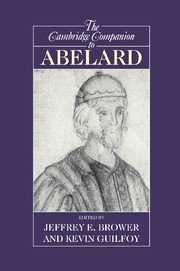12 results
Aquinas on the Nature of Lying
-
- Journal:
- New Blackfriars / Volume 104 / Issue 1114 / November 2023
- Published online by Cambridge University Press:
- 01 January 2024, pp. 613-627
- Print publication:
- November 2023
-
- Article
-
- You have access
- Open access
- HTML
- Export citation
2 - First Principles
- from Part II - Metaphysics and the Ultimate Foundation of Reality
-
-
- Book:
- The New Cambridge Companion to Aquinas
- Published online:
- 30 July 2022
- Print publication:
- 11 August 2022, pp 31-56
-
- Chapter
- Export citation
Contributors
-
-
- Book:
- The Cambridge Dictionary of Philosophy
- Published online:
- 05 August 2015
- Print publication:
- 27 April 2015, pp ix-xxx
-
- Chapter
- Export citation
10 - Anselm on ethics
-
-
- Book:
- The Cambridge Companion to Anselm
- Published online:
- 28 May 2006
- Print publication:
- 02 December 2004, pp 222-256
-
- Chapter
- Export citation
List of Abelard’s writings
-
- Book:
- The Cambridge Companion to Abelard
- Published online:
- 28 May 2006
- Print publication:
- 18 March 2004, pp 336-340
-
- Chapter
- Export citation
Frontmatter
-
- Book:
- The Cambridge Companion to Abelard
- Published online:
- 28 May 2006
- Print publication:
- 18 March 2004, pp i-xx
-
- Chapter
- Export citation
Introduction
-
-
- Book:
- The Cambridge Companion to Abelard
- Published online:
- 28 May 2006
- Print publication:
- 18 March 2004, pp 1-12
-
- Chapter
- Export citation
Index
-
- Book:
- The Cambridge Companion to Abelard
- Published online:
- 28 May 2006
- Print publication:
- 18 March 2004, pp 357-362
-
- Chapter
- Export citation
Bibliography
-
- Book:
- The Cambridge Companion to Abelard
- Published online:
- 28 May 2006
- Print publication:
- 18 March 2004, pp 341-356
-
- Chapter
- Export citation

The Cambridge Companion to Abelard
-
- Published online:
- 28 May 2006
- Print publication:
- 18 March 2004
7 - Trinity
-
-
- Book:
- The Cambridge Companion to Abelard
- Published online:
- 28 May 2006
- Print publication:
- 18 March 2004, pp 223-257
-
- Chapter
- Export citation



